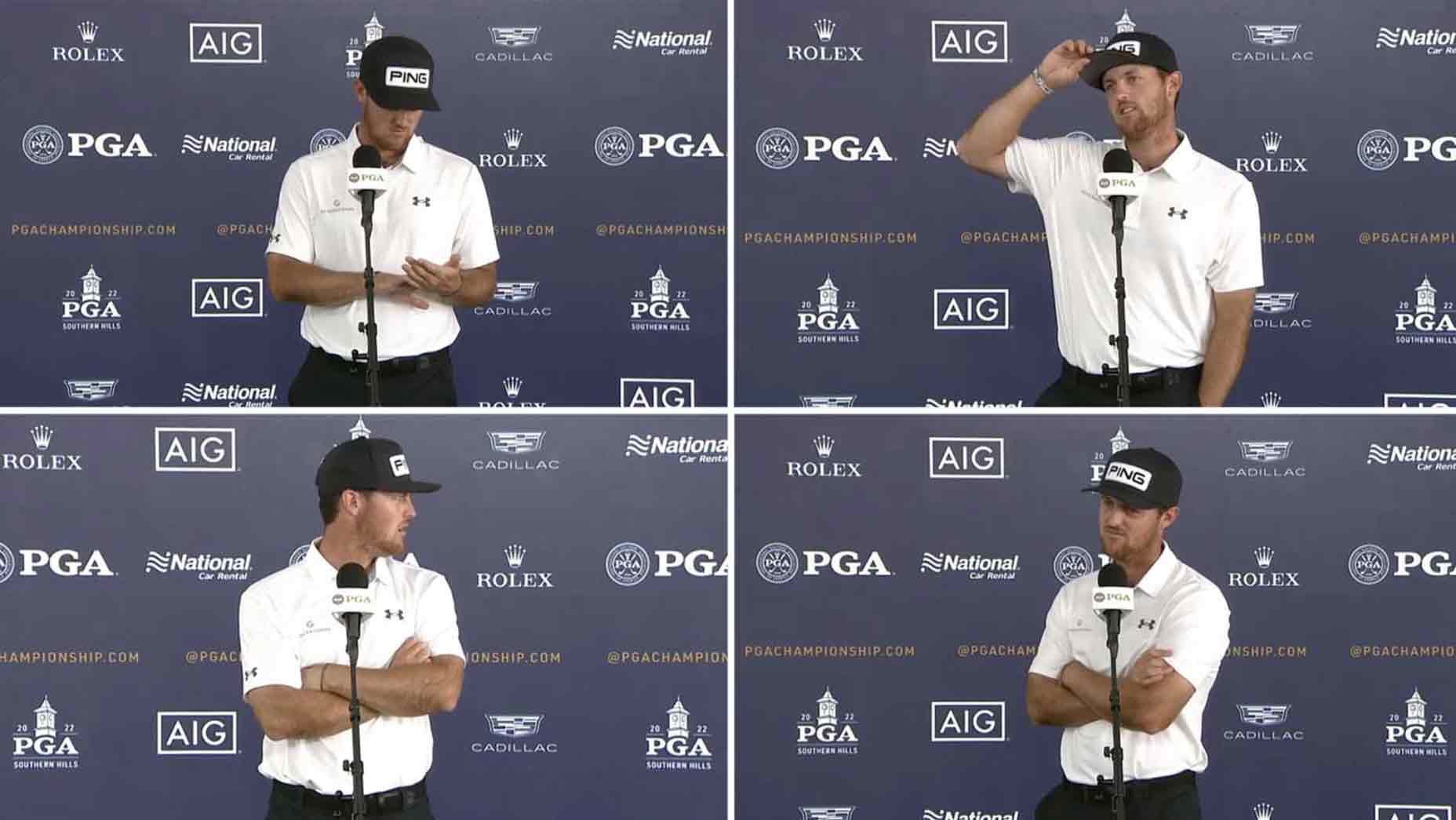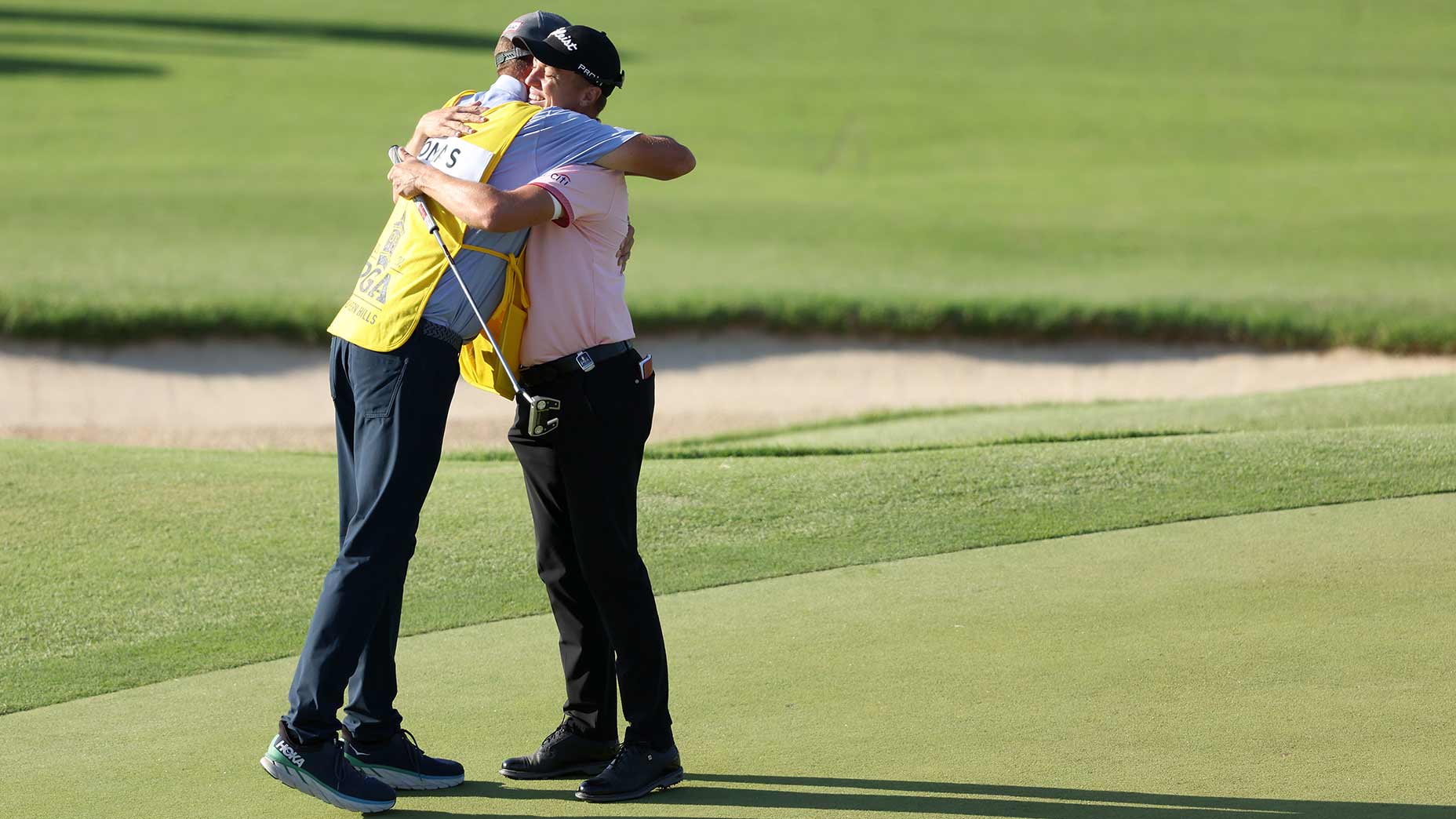Stewart Cink shot a 7-under 64 on Thursday to take a three-stroke lead after the first round of the Charles Schwab Cup Championship.
After stunning miscue, Mito Periera was left to explain the unexplainable


Mito Periera faced the press on Sunday evening.
PGA of America
As Mito Pereira, lead in hand, was playing the back nine Sunday at the PGA Championship, his close Tour buddy and fellow Chilean Joaquin Niemann was reflecting on what a Pereira win would mean to their homeland.
“It is going to be something huge,” Niemann said. “You look back, three, four years ago, nobody talked about golf, and now the whole country is watching TV right now seeing Mito leading the PGA Championship.”
You couldn’t blame Niemann for getting ahead of himself. Pereira wasn’t playing his best golf of the week, but, really, none of the most serious contenders were, either. With just a handful of holes remaining, the 104th PGA Championship was Pereira’s to lose.
“I cannot imagine him not winning,” Niemann said.

Mito Pereira and his caddie, Scott McGuinness, on the 18th hole at Southern Hills Sunday.
getty images
Pereira couldn’t, either — at least not when he stepped onto the tee on the 72nd hole with a one-stroke lead. Pereira had played the nearly 500-yard closer beautifully all week, splitting the fairway and hitting the green in each of his first three visits. He parred the hole on Thursday and Friday and jarred a 27-footer for birdie on Saturday. One-under in three trips. One more par and he was a major champion.
“I thought I was going to win,” Periera said later.
As he addressed his tee ball, Pereira was trying to replicate the same shot he had hit a day earlier: a low straight bullet. “I’m really confident with that one,” he said. Moments after impact, though, it was clear he had not executed his plan. His awkward, sawed-off, holding-on-for-dear-life follow-through looked less like something you’d see from a world-class golfer in a major championship and more like a move you might see at your local muni. “Look at that follow-through,” Jim Nantz said from the booth. Nantz, like the rest of us, was incredulous.
You can’t miss right on 18 at Southern Hills — the fairway in the landing zone pitches hard in that direction toward a ball-gobbling creek — but that’s exactly what Pereira did. Just like that: Gurgle, gurgle. Game over. A drowning on national television.
Sam Snead knew the feeling. With a 72nd hole lead at the 1939 U.S. Open, he knocked his tee shot into a bunker. His next swing was even worse, a topped fairway wood that trundled into a ditch. He made triple bogey and finished fifth. Jean van de Velde knows the feeling. His lead-blowing triple on Carnoustie’s closer at the 1999 British Open is lodged in our collective memories like a horrifying car crash we just can’t shake. Phil Mickelson knows the feeling. His blocked tee shot at Winged Foot in 2006 and the subsequent messiness? He summed up the implosion in two words: “a nightmare.”
Perhaps it’s unfair to lump in Pereira’s miscue with those episodes; after all, he made just one loose swing, not a series of blunders. Still, though, it’s a tough gaffe to sugar-coat: Pereira couldn’t miss right, and he missed right. Then came the really hard part: trying to explain it. The swing will no doubt take weeks for Pereira to process, maybe months, maybe years. Maybe he will never fully get his head around it. But in the seven-figure-pay-check tier of professional golf, you don’t enjoy the luxury of digesting on-course horrors on your own schedule. The world wants answers immediately.
And so there was Pereira on Sunday evening at Southern Hills, a lone microphone on a stand in front of him and a group of reporters waiting to peer into his soul.
What happened?
Nerves seemed an obvious explanation, and Pereira didn’t shy away from admitting he felt them. First on Thursday. Then a bit more on Friday. Then more still on Saturday. “The fourth day was terrible,” he said, speaking of Sunday, when he held the 54-hole lead by three. “I mean, this morning was tough.” Pereira didn’t articulate what his nerves felt like before that fateful swing, but presumably they were jumping. He did say, “You’re in such a stressful situation that everything can change.”
Your composure. Your clear-headedness. Yes, even your swing. When the vise starts to squeeze on major Sundays, mechanics can be one of the first things to go. Pereira needed just one more solid tee shot. Like Snead and van de Velde and Mickelson before him, he couldn’t summon it.
He also couldn’t explain it. “I don’t know what happened,” he said.
After taking a drop and tugging his third shot left of his mark, Pereira began the uphill march to the 18th green, where just minutes earlier he had envisioned the throngs greeting him there as a victor. Pereira said he felt a strange cocktail of emotions in that moment: pride, because he had put himself in a position to win, but also shame, because he had kicked away a chance to slam the door.
The player who went on to win Sunday knows what that feels like.
“I have had times in my career when I feel like I’ve let a tournament get away,” Justin Thomas said after he’d dispatched Will Zalatoris in a three-hole playoff. “It’s brutal. It’s not fun.”
Pereira’s fourth-round playing partner also knows what it’s feels like.
“It is tough to take,” Matt Fitzpatrick said of the unfortunateness he had witnessed on the 72nd hole. “You hope it’s not you.”
On Sunday, the disappointment and regret were Pereira’s burden to carry. Soon enough, it will be another player’s turn.


